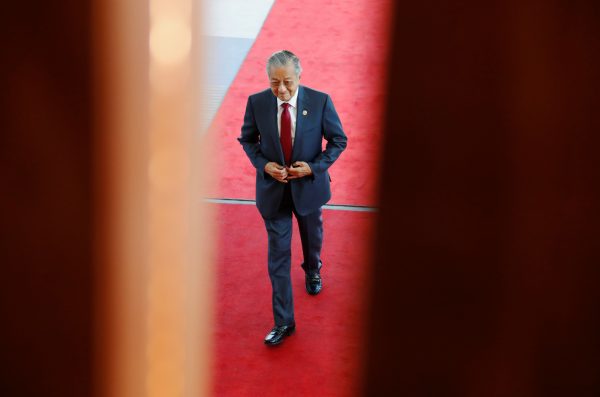For 44 years, Malaysia had operated under a hybrid regime — democratic in appearance but authoritarian in substance. A transfer of power through peaceful elections seemed to present Malaysia as a late and unexpected arrival to the flagging community of democratic nations.
But by year’s end, the likes of Lim Kit Siang, a long-time leader of the Democratic Action Party, were cautioning that the country would need another decade or two to complete its democratisation. In their exuberance over Pakatan’s victory, foreign pundits and local middle-class urbanites seem to have been misled about the potential for institutional reform under the new government.
Citizens who voted for Pakatan often did so more out of contempt for Barisan’s corruption — crystallising in former prime minister and UMNO president Najib Razak’s abuse of the 1Malaysia Development Berhad (1MDB) fund — than out of regard for Pakatan’s vision of an inclusive society. Precisely because of this vision, most Malays remained unconvinced that Pakatan would defend their ‘special rights’ as Barisan had. Nearly three-quarters of Malay voters either cast their ballots for Barisan despite the 1MDB scandal, or for the Islamic Party of Malaysia (PAS) whose leader intoned that the scandal was overblown. UMNO and PAS might have taken power together had they coalesced into a formal coalition.
So Pakatan’s new government was from the start on shaky ground. Its seats in parliament and state assemblies increased throughout 2018 as legislators flocked to it from UMNO and sundry regional vehicles, but this hardly amounted to democratic progress. Rather it involved defection and hopping in search of fresh patronage — reminiscent of the shiftless party systems that operate elsewhere in Southeast Asia during democratic hiatuses.
In this context, Pakatan struggled during its first months in power to make good on the dozens of pledges that featured in its election manifesto. Intended to bolster democratic procedures and governance, Pakatan’s reforms were either blocked outright, better exploited by UMNO and PAS politicians, or thwarted by communal insistence on Malay and Islamic supremacy.
Pakatan pledged to impose term limits on top executive positions, including the prime ministership. But lacking a two-thirds majority in parliament, parliamentary procedures prevented the government from passing the necessary constitutional amendment. UMNO and PAS parliamentarians are less interested in imposing accountability than in showing defiance by grandstanding, heckling ministers and obstructing reforms.
Pakatan also sought to institute a system of select committees to further check the executive and strengthen parliament. This would transfer powers of appointment over parts of the Attorney General’s Chambers, the Judicial Appointments Commission, the Malaysian Anti-Corruption Commission and the Election Commission from the Prime Minister’s Office to relevant committees in parliament. But in its urgency to be seen delivering justice over 1MDB, Pakatan left in place the legal framework that it inherited, paving the way for it to lay it first charges against Najib and his allies in July.
Even if select committees are eventually formed, it is difficult to see how they might gain significantly more autonomy and better impose accountability in the current milieu. With the cascading defections anticipated from UMNO, conduits between executive and legal institutions would hardly be interrupted when committees swell with old Pakatan MPs and newcomers, many of whom are keen to trade off their loyalties for patronage.
As for democratic development, perhaps the only thing worse than an opposition geared to knee-jerk obstruction is its vanishing altogether. The prospect of the opposition shrinking down to a bare rump of UMNO holdouts and PAS hardliners looms.
Pakatan also pledged to strengthen civil liberties. In pursuit of media freedom, it sought to abolish the Anti-Fake News Act, a law passed by the Barisan government in its waning days to ward off criticism over 1MDB. Although Barisan is now in opposition in the lower house, its appointees retain a majority in the Senate. For the first time in Malaysia’s political record, the Senate rejected a sitting government’s legislative preference, leaving the Anti-Fake News Act in effect.
Finally, Pakatan sought to strengthen freedom of assembly. To this end, it pledged to revise the Security Ordinances (Special Measures) Act (SOSMA) instituted by the Barisan government as a successor to the country’s colonial-era Internal Security Act. At the same time, Pakatan pledged to sign the International Convention against All Forms of Ethnic and Religious Discrimination (ICERD). This prompted UMNO and PAS to inflame Malay fears over a loss of communal status, metastasising in mass protests in Kuala Lumpur in December. Pakatan duly recoiled from signing the ICERD. But with some irony: while striving to respect civil liberties, Pakatan initially tried to contain the protest by invoking SOSMA.
Malaysia’s democratisation is not helped by the lack of financial surpluses. Like many developing countries, capital in-flows have retreated from Malaysia to the United States. The exports of palm oil upon which Malaysia has come to depend face a ban in European markets. Investment and lending from China have been dampened by the Pakatan government’s cancellation of large Belt Road Initiative projects. And, of course, Malaysia faces a decade or more of payments to creditors and litigants under 1MDB.
None of this will help to assuage the disillusion and resentment that simmers in Malaysia today.
William Case is Professor and Head of the School of Politics, History and International Relations at the University of Nottingham Malaysia Campus.
This article is part of an EAF special feature series on 2018 in review and the year ahead.

